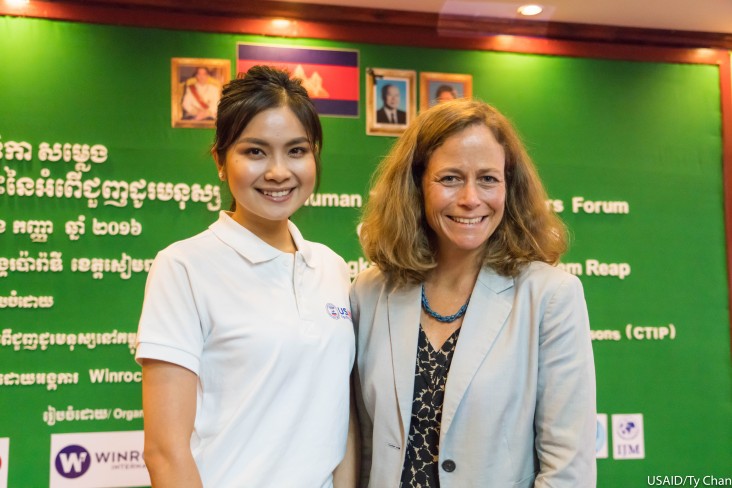
(as prepared for delivery)
- Her Excellency Chou Bun Eng, Permanent Vice-Chairperson of the National Committee for Counter Trafficking and Secretary of State, Ministry of Interior;
- distinguished guests,
- ladies and gentlemen.
I want to thank you for inviting me to attend the closing day of this important event. As some of you may know, as new Mission Director of USAID, I’ve have not been in the country very long. But I have already developed an appreciation for this beautiful and fascinating country and I have great respect for its people. I’m also gaining a better understanding of the difficult challenges this country continues to face. No challenge may be greater than the transnational crime of human trafficking, which as a global problem, impacts millions of people world-wide each year, and has a deep impact on Cambodia.
I would like to take this opportunity to thank Her Excellency Chou Bun Eng, who is here today and has been playing a leading role in the Royal Government of Cambodia’s fight against human trafficking efforts. Your Excellency, thank you for your strong and tireless efforts.
The U.S. Government cares deeply about trafficking in persons because it affects not just individuals and their families, but also communities and entire countries, regardless of their economic development. We are pleased to be a partner in the extraordinary work of the NCCT, chaired by Samdach Krolahorm Sar Kheng and led by Her Excellency Chou Bun Eng. Across the globe, we’ve seen that strong coordination among government, civil society, and the private sector is critical for ending human traffickingand the NCCT has provided thekind of leadership and coordination needed to make substantial, real progress against human trafficking.
Human trafficking is a global human rights challenge. It preys upon the vulnerable, breaks down rule of law, and corrupts global commerce. The U.S. Government, through USAID, the Department of State and other agencies, supports all four strategic pillars of counter-trafficking response: prevention, protection, prosecution, and partnership. In Cambodia, we have been working on these issues closely with the Government of Cambodia for more than a decade. The USAID project Countering Trafficking in Persons works to address the root causes of trafficking, protect and assist victims who have been trafficked, increase the likelihood of prosecution of those who are involved in this hideous crime and strengthen local governance structures to address these crimes.
Of course, fighting against human trafficking isn’t only about prosecuting perpetrators, but also about rescuing and protecting the victims. As a mother of three young girls, I am heartbroken to think of what families and communities go through as they wait for news of their loved ones. Unfortunelty, it is often young people under the age of 30 from rural populations who leave home in search of work in Phnom Penh or across Cambodia’s porous borders in Thailand, Malaysia, and elsewhere. Most are under educated, lack legal protection and have a low level of awareness of the risks associated with labor migration. While we work to halt trafficking completely, we can offer victim assistance services now, such as vocational training, rehabilitation, reintegration, and community-based aftercare monitoring are critical to ensure survivors do not become trafficked again in the future.
I commend the efforts undertaken by the Cambodia Government to combat human trafficking and develop effective migration policies. But because this is a global issue, we cannot put the burden on one government or one organization. Rather this is a task for all of us, and will require our shared expertise and resources.
Today we have an opportunity to be together to discuss what have has worked, what has not worked, and what we need to do more of in order to ensure that the survivors have all they need as part of their integration process back into their family and community. The feedback that we hear from all of you during this forum will be extremely useful when we begin to design our future programming.
We want to be effective; we want to be part of the community world-wide that is not just shaking their heads and saying how dreadful this problem is, but working to reduce the causes of trafficking and working to help victims and survivors find, purposeful and productive lives.
In closing, I would like to recognize once again the important progress the Cambodian government and its partners have made to combat human trafficking of all kinds. We re affirm our committment to working closely with the you all on this critical challenge in the months and years ahead. Our hope is that one day, when Cambodians seek to migrate for employment, they can do so safely and legally, and work and live in dignity and without fear of being trafficked.
Thank you very much.
Related Speeches
- Remarks by Polly Dunford, Mission Director, USAID Cambodia, Launch Event of Feed the Future Cambodia Harvest II
- Remarks by Christina Lau, Deputy Director, Office of Public Health and Education, USAID/Cambodia, Opening Ceremony of the Kick-Off Workshop for “One Health Workforce”
- Remarks by Veena Reddy, Deputy Mission Director, USAID Cambodia, EPIC Showcase







Comment
Make a general inquiry or suggest an improvement.